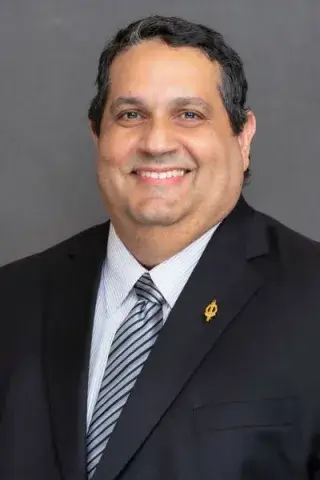Saint Leo Faculty Member Discusses Cybersecurity Awareness in the Digital Age
University continues to highlight the field of cybersecurity during awareness month

University continues to highlight the field of cybersecurity during awareness month

October is Cybersecurity Awareness Month, a national initiative dedicated to promoting digital safety and strengthening the cybersecurity workforce. As one of the Tampa Bay area’s first institutions to offer cybersecurity degrees and a recognized leader in online education, Saint Leo University is leading the way in preparing students for employment in the cyber sector. From the university’s expanded cybersecurity degree offerings to upcoming regional events, this month highlights innovations in cybersecurity education and advancements that affect life beyond the classroom.

In this article, Dr. Edward Santiago, assistant professor of computer science in the university's College of Computing, Artificial Intelligence, Robotics, and Data Science (CARDS), examines how cybersecurity affects everyday life and why awareness is essential in today’s digital world.
Cybersecurity and You
Since the first personal computers appeared in the 1980s, information systems have evolved dramatically. The rise of connectivism, a learning model popularized by George Siemens in the early 2000s, led to massive open online courses (MOOCs) and transformed the way we learn online. As more aspects of life have gone digital, the amount of data we generate has skyrocketed.
Our daily lives are now filled with connected technology. Landline phones have been replaced by multiple IoT (Internet of Things) devices in nearly every home, and almost everyone carries a smartphone that tracks movements and habits. In 2025, roughly 68.7 percent of the global population uses the internet on a regular basis, according to rankings by the World Bank Group. Research from statistician Naveen Kumar shows that nearly 90 percent of the world’s population uses smartphones. Countries such as Saudi Arabia, Bahrain, and Kuwait claim to have close to 100 percent of their population with internet access. The volume of data generated by these devices is staggering.
But where does all this data go? Several sources exist, but two stand out: Data.gov/, the official website of the U.S. government, and data brokers. In their series on data privacy in The New York Times, authors Rachel Cericola, Jon Chase, and Lee Neikirk write that all the devices that people voluntarily connect to their Wi-Fi are actively collecting data; your movements, locations, and behaviors are recorded in some database for future analysis. Based on the data collected, it would be very easy for anyone to determine your routines with incredible precision. The more devices you own, the more vulnerable your digital footprint becomes.
The reliance on digital devices may seem excessive to some, but many people willingly exchange privacy for convenience. In many U.S. schools, teachers report that cellphone usage has become a distraction among high school students, and legislation on the issue is beginning to appear. Historically, new technologies, from electricity to the internet, faced misunderstanding or resistance before becoming normalized. Regardless of the initial pushback, technology and artificial intelligence (AI) are part of our modern society.
In today’s digital age, we can only approach innovation with caution and adjust to its pace. Be aware that every digital device collects, tracks, and monitors your activity, especially those connected to a Wi-Fi service. Knowing what you can share, especially with AI systems that learn from your input, is a step towards information security. AI is smart because everything you type becomes part of its knowledge base. In the end, nothing is truly free — someone always pays. And in the digital economy, the product is often you.
Cybersecurity Tips for Daily Life
About Dr. Edward Santiago
Santiago teaches cybersecurity and AI at both the graduate and undergraduate levels at Saint Leo's College of CARDS. With more than 25 years in IT, cybersecurity, and academic leadership, he mentors students, leads the PenTest Club competitions, and creates hands-on learning experiences. Santiago has taught globally, published research and opinion pieces, and served in military and civilian technology roles. Holding a doctorate in Management Information Systems and an MBA, he blends practical expertise with a passion for guiding the next generation of technology and cybersecurity professionals.
As part of his emphasis on educating through real-world scenarios, Santiago will accompany the Saint Leo PenTest Club to the CyberBay Summit 2025 Capture the Flag competition on October 15, and the Raymond James Capture the Flag competition on October 18.
Saint Leo University Cybersecurity Programs
In 2023, Saint Leo University founded the College of CARDS to meet the rising demand for high-quality education in the tech sector. Today, more than 500 Saint Leo students are pursuing cybersecurity degrees, and the university is designated as a National Center of Academic Excellence in Cyber Defense Education by the National Security Agency (NSA) and U.S. Department of Homeland Security.
Students can take cybersecurity classes on the Saint Leo University campus, online, or at the Key West and Tampa education centers. Programs include associate, bachelor’s, and master’s degrees, as well as an MBA in cybersecurity management. The university also offers a cybersecurity certification program for working professionals through the Saint Leo Skills Academy.
For Information
Learn more about Saint Leo University’s cybersecurity degree programs, email admissions.grad@saintleo.edu.
Education Center admissions information can be found at www.saintleo.edu/admissions/education-center.